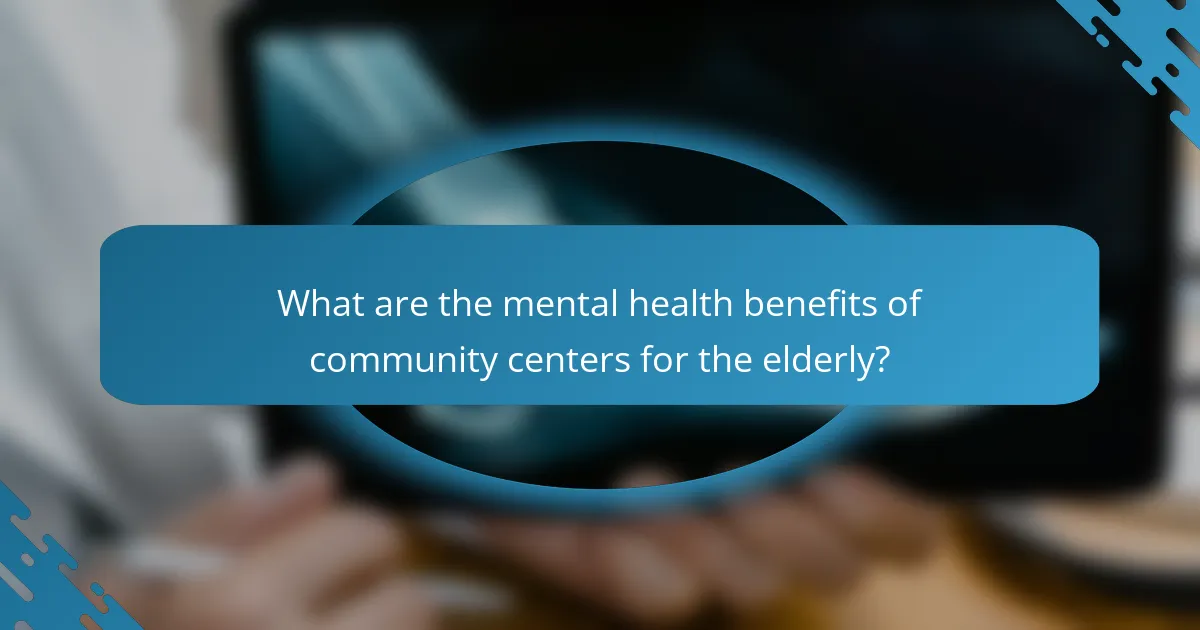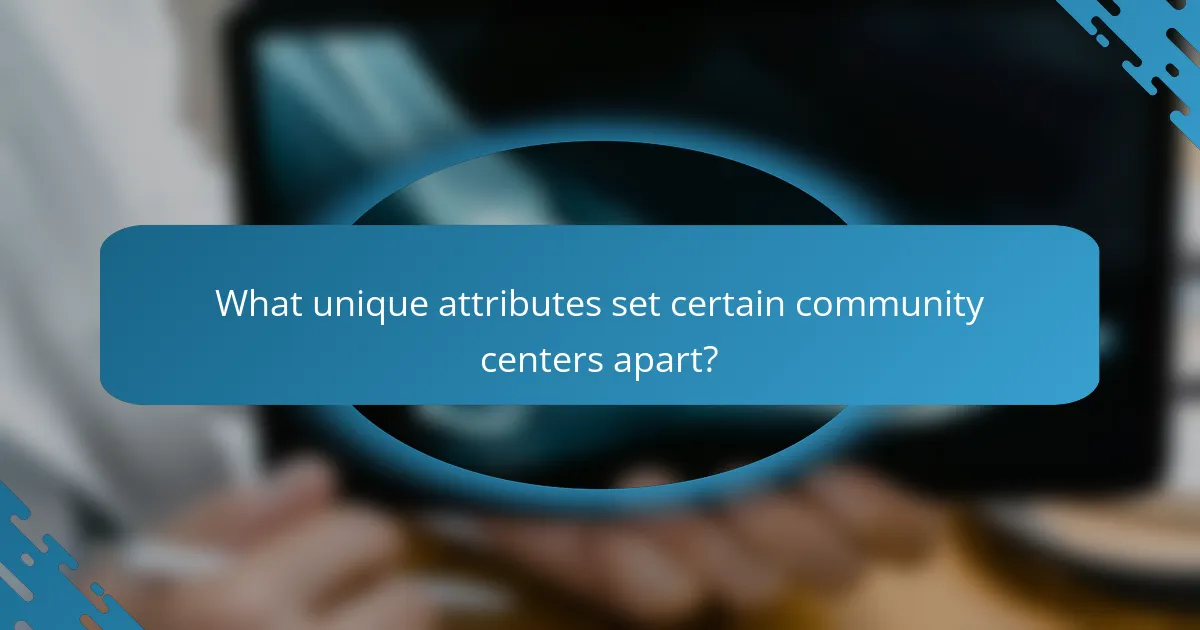Community centers provide essential mental health benefits for the elderly by reducing isolation and fostering social connections. They offer structured activities that enhance emotional well-being and cognitive function. Access to tailored resources, such as counselling and wellness programmes, supports those in need. Unique programmes like art therapy and peer support groups further promote a sense of belonging and purpose among seniors.

What are the mental health benefits of community centers for the elderly?
Community centers provide significant mental health benefits for the elderly by fostering social connections and reducing feelings of isolation. Engaging in community activities promotes emotional well-being and enhances cognitive function. Regular participation in group programmes can decrease symptoms of depression and anxiety, improving overall mental health. Additionally, community centers offer resources like counselling services and wellness programmes, which further support mental health needs.
How do community centers foster social connections among seniors?
Community centers foster social connections among seniors by providing a welcoming environment that encourages interaction. These centers offer various activities, such as arts and crafts, fitness classes, and social events, specifically designed to engage elderly participants. As a result, seniors can build friendships, share experiences, and combat loneliness, which significantly enhances their mental health. Studies show that regular social interaction can reduce depression and anxiety, leading to improved emotional well-being. Additionally, community centers often serve as hubs for resources and support, further strengthening the social fabric among older adults.
What activities promote interaction and bonding?
Community centers enhance interaction and bonding through various activities. Group exercises, art classes, and social events foster connections among elderly participants. These activities not only promote mental health but also create a supportive environment. Engaging in shared interests reduces feelings of isolation and encourages friendships, contributing to overall well-being.
How do volunteer opportunities enhance community engagement?
Volunteer opportunities significantly enhance community engagement by fostering social connections and promoting mental well-being. Participation in these activities creates a sense of belonging among elderly individuals, reducing feelings of isolation. Community centers often provide structured programmes that encourage interaction, leading to improved emotional health. Engaging in volunteer work can also boost self-esteem and purpose, contributing to a holistic approach to mental health for the elderly.
In what ways do community centers offer emotional support?
Community centers provide emotional support to the elderly through social interaction, structured activities, and access to mental health resources. These centers foster a sense of belonging, reducing feelings of isolation. Engaging in group activities promotes companionship, which is vital for mental well-being. Additionally, many community centers offer workshops and counselling services, addressing unique emotional needs of older adults. Programmes focusing on art, music, and physical activity contribute to emotional resilience, enhancing overall mental health.
What role do support groups play in mental wellness?
Support groups significantly enhance mental wellness for the elderly. They provide emotional support, reduce feelings of isolation, and promote shared experiences. Participation in these groups can lead to improved mental health outcomes, such as reduced anxiety and depression. Community centers often facilitate these groups, fostering a sense of belonging and community engagement. This unique attribute of support groups helps elderly individuals navigate life changes more effectively.
How do counselling services contribute to mental health?
Counselling services significantly enhance mental health by providing emotional support and coping strategies. They foster social connections, reducing feelings of isolation among the elderly. Community centers offer tailored programmes that address unique challenges faced by older adults, such as grief and loneliness. Access to professional counselling can lead to improved mental well-being, increased resilience, and a greater sense of community belonging.
What unique programmes do community centers provide for cognitive health?
Community centers offer unique programmes that enhance cognitive health for the elderly. These programmes often include memory workshops, art therapy sessions, and social engagement activities designed to stimulate mental function.
Memory workshops focus on exercises that improve recall and cognitive processing. Art therapy sessions encourage creativity, which can lead to improved emotional well-being. Social engagement activities foster connections, reducing feelings of isolation and enhancing mental resilience.
By participating in these programmes, elderly individuals can experience noticeable improvements in cognitive health, including better memory retention and increased mental agility.
How do memory enhancement workshops operate?
Memory enhancement workshops typically focus on cognitive exercises and activities designed to improve memory skills among participants. These workshops often utilize techniques such as mnemonic devices, memory games, and group discussions to engage elderly attendees, fostering social interaction and mental stimulation. As a result, participants can experience improved cognitive function and enhanced mental well-being. Community centers play a crucial role by providing accessible venues for these workshops, promoting both mental health and social connectivity among the elderly.
What is the impact of arts and crafts on mental stimulation?
Engaging in arts and crafts significantly enhances mental stimulation for the elderly. These activities foster creativity, improve cognitive function, and provide social interaction, all vital for mental health. Studies indicate that creative pursuits can reduce symptoms of anxiety and depression, promoting overall well-being. Additionally, community centers offer structured environments that encourage participation, further amplifying these benefits.

What universal attributes enhance the mental health benefits of community centers?
Community centers enhance mental health benefits for the elderly through social interaction, structured activities, and access to resources. These centers foster a sense of belonging, combating loneliness. Regular engagement in community events promotes emotional well-being and cognitive function. Access to mental health resources supports those in need, creating a supportive environment.
How does physical activity at community centers improve mental health?
Physical activity at community centers significantly enhances mental health among the elderly. Engaging in regular exercise reduces symptoms of depression and anxiety while boosting overall mood.
Social interactions during these activities foster a sense of belonging, combating loneliness. Studies show that seniors who participate in group exercises report higher life satisfaction.
Unique attributes of community centers include access to diverse programmes tailored for older adults, promoting both physical and mental well-being. These centers often provide resources like trained staff and safe environments, further supporting mental health initiatives.
Overall, community centers serve as vital hubs for improving mental health through structured physical activity and social engagement.
What role does structured routine play in seniors’ mental well-being?
Structured routines significantly enhance seniors’ mental well-being by providing stability and predictability. Engaging in regular activities at community centers fosters social interaction, reduces feelings of isolation, and promotes cognitive engagement. Studies indicate that seniors with structured routines experience lower anxiety levels and improved mood. Additionally, participation in group activities can lead to a sense of purpose and belonging, crucial for mental health.

What unique attributes set certain community centers apart?
Community centers for the elderly stand out due to unique attributes like specialized programmes, trained staff, and tailored activities. These centers often offer mental health workshops, social engagement opportunities, and wellness initiatives that specifically address the needs of older adults. For example, some centers provide art therapy sessions designed to enhance emotional well-being. Additionally, the presence of peer support groups creates a sense of belonging, which is crucial for mental health. These unique attributes contribute significantly to fostering a supportive environment that promotes mental wellness among seniors.
How do specialized programmes for dementia care impact mental health?
Specialized programmes for dementia care significantly enhance mental health by fostering social interaction and providing tailored support. These programmes reduce feelings of isolation, promote cognitive engagement, and improve overall emotional well-being. Community centers play a crucial role in creating a supportive environment, allowing elderly individuals to connect with peers and participate in meaningful activities. Engaging in structured programmes can lead to a noticeable decrease in anxiety and depression symptoms among participants.
What innovative technologies are being used in community centers?
Community centers are leveraging innovative technologies to enhance mental health support for the elderly. Virtual reality programmes provide immersive experiences that promote relaxation and cognitive engagement. Telehealth services enable remote consultations with mental health professionals, improving access to care. Social media platforms foster community connections, reducing feelings of isolation. Wearable devices track health metrics, allowing for personalized wellness programmes. These technologies collectively contribute to improved mental well-being among elderly community center participants.

What rare attributes contribute to exceptional mental health outcomes?
Community centers for the elderly enhance mental health through unique attributes like social engagement, tailored activities, and intergenerational interactions. These factors promote cognitive stimulation and emotional support, leading to improved well-being. For instance, programmes that encourage storytelling or art can reduce feelings of isolation. Additionally, centers often provide access to mental health resources, which is rare in traditional settings. These elements contribute to exceptional mental health outcomes by fostering a sense of belonging and purpose among older adults.
How do intergenerational programmes influence elderly mental health?
Intergenerational programmes significantly enhance elderly mental health by fostering social connections and reducing loneliness. These initiatives promote engagement with younger generations, leading to improved emotional well-being and cognitive function. Research shows that participation in such programmes can decrease symptoms of depression and anxiety among seniors. Additionally, these interactions provide a sense of purpose and belonging, which are crucial for mental resilience.
What are the effects of pet therapy sessions in community centers?
Pet therapy sessions in community centers significantly enhance the mental health of the elderly. These sessions promote emotional well-being, reduce feelings of loneliness, and foster social interaction among participants. Engaging with therapy animals can lead to a decrease in anxiety and depression levels, providing a unique attribute that differentiates these sessions from traditional therapy methods. Studies indicate that regular interaction with pets can improve mood and increase feelings of happiness, contributing to a more fulfilling life for elderly individuals in community settings.
What best practices can community centers adopt to maximize mental health benefits?
Community centers can enhance mental health benefits for the elderly by creating supportive environments. They should prioritize social engagement, offering regular activities that foster connections among participants. Providing access to mental health resources and trained staff can address specific needs. Promoting physical activity through exercise programmes contributes positively to mental well-being. Finally, ensuring a welcoming atmosphere encourages participation and reduces isolation among seniors.